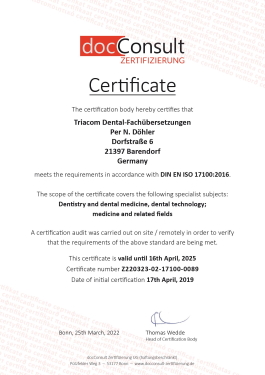Why ISO certification?
We want to fit into your quality management system.
When you place an order for a translation, you have certain quality expectations.
Triacom is certified according to DIN EN ISO 17100:2016 (“Translation Services – Requirements for translation services”), which means that our services can be integrated into our clients’ certified quality processes and that we can provide services that meet the requirements of the standard.
DIN EN ISO 17100:2016 (“ISO 17100”) is an international quality standard for the translation industry. It “includes provisions [...] concerning the management of core processes, minimum quality requirements, the availability and management of resources, and other actions necessary for the delivery of a quality translation service.” In addition to the actual translation and revision, the standard addresses preparation and feedback processes, security issues, and technical capabilities.
The standard sets out specific qualification and competence requirements for translators and revisers (which is what the standard calle reviewers). We, and all the translators we work with, meet these requirements: a recognized university degree in translation or equivalent in another field with two years (full-time equivalent) of documented experience as a translator, or at least five years (full-time equivalent of documented, professional experience as a translator. Most of us have been working in our field for several decades—and we keep our knowledge up to date.
This website probably demonstrates what we do, how we work, and who we are, as well as our past performance and experience better than any audit could. It shows you that that we have the required dental and medical expertise in our language combinations that we have been providing to our clients for 35 years now.
In many cases our clients will request a “basic” translation without any standard-related overhead or value-added services (“basic” refers a level of process performance, not, of course, to the accuracy and appropriateness of a translation or its suitability for its purpose, which must never be compromised). They use the results as part of or in the context of their own downstream process chains.
However, some of our corporate clients are themselves certified according to a specific quality standard and therefore request the value-added services defined by ISO 17100, either individually or as part as an complete ISO 17100-compliant package:
- Production of a translation by two people — one in the role of translator and one in the role of reviser — who have the same high level of qualification.
- Full documentation of every step of the process to demonstrate compliance with the standard for internal quality processes or audits.
This requires additional resources and additional time and effort in terms of performance and project coordination. If a project is to be completed in full compliance with ISO 17100, this should best be communicated and explicitly agreed at the RFP stage.

